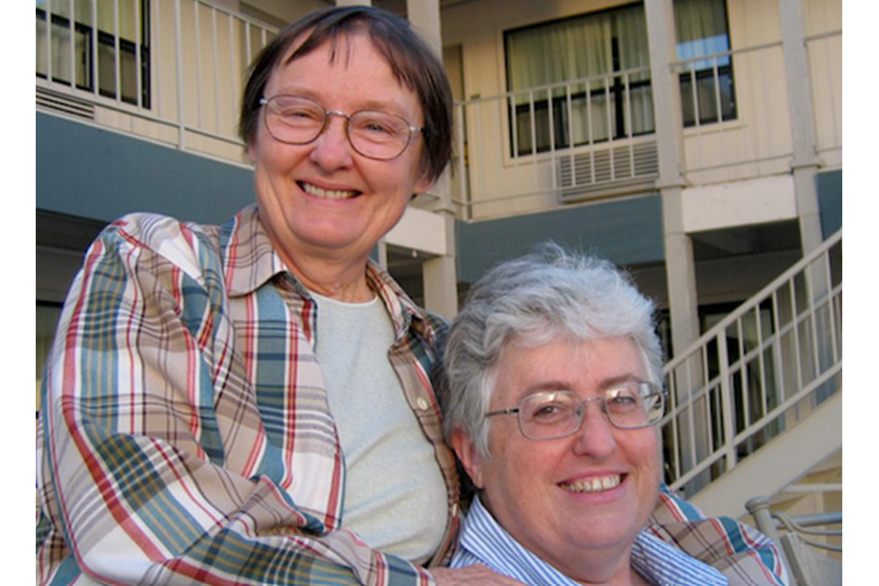
Before Arden Eversmeyer began gathering oral herstories over 25 years ago, there was no written record on the lives of lesbians, in particular old lesbians, in America.Now, decades and hundreds of stories later, the Old Lesbian Oral Herstory Project (OLOHP), stands as a one-of-a-kind archive that illuminates the once hidden lives of early LBGT figures.As the project winds down, it is reaching new audiences thanks to the documentary Old Lesbians by Meghan McDonough.Senior Planet spoke with Margaret Purcell, 73, who took over as the director of OLOHP after the founder, Arden Eversmeyer, passed,.
We also spoke to Mary Henry, 86, (Secretary of the Board of Directors and Editor) and to Aganita Varkentine, 84, (Interviewer and Administrator, pictured at left) about the importance of oral histories and the technological components of creating an archive.Why is the work of preserving the oral herstory of lesbians important?Margaret: First of all, we all need to be aware that these women lived their lives during a period drastically different to where we are now.Finding any information about what they were feeling was nearly impossible.
Staying safe was a huge challenge: It wasnt at all uncommon for women to be fired from their jobs, kicked out of school or of the military, be rejected by their family and church, divorced against their will, sometimes losing custody of their children, and more.Some women were even institutionalized in hopes of curing them.They have an important story to tell, and we wanted them to be able to tell it in their own words, not to a researcher who then shares what they think that woman said or felt.Aganita: Things have changed a lot in recent years, and it is important that the new generation of lesbians not forget what life was like for their foremothers.
There were battles fought in the past that very well may come again, and past experience may well come in handy.How do you gather these oral herstories? Can people self-submit?Margaret: The process is basically that we connect with someone who qualifies for the Project a lesbian 70 or older and arrange to do the interview.For the first 20+ years, interviews were always done in person, often in the womans own home while she sat in her favorite chair.When COVID hit, we took the leap and learned Zoom.
While its not quite the same, it does come close.All the interviews are recorded, then the audio is transcribed.We also ask women to share photos, and any other documents like articles theyve written, graduation certificates, and such.We combine those with their transcript, and put it together as a bound book.What do you personally get out of working with OLOHP?Margaret: Working with the OLOHP has been an incredible gift to me personally.
I truly feel privileged to have listened to hundreds of women share about their early childhood, their first crushes, coming out, marriages/other relationships, difficulties, triumphs, lessons, losses and much more.Mary: I have met and worked with women of all sorts.Ive heard and read their stories.Ive had a part in several presentations that share their stories with the wider world.
All of it has contributed to my quality of life and appreciation of other old lesbians.What technology do you use in the project?Margaret: When the Project first began in 1998, it was a matter of lugging along a relatively large tape recorder and praying the audio quality was decent and that the recorder worked through the whole interview! After a while, we moved to handheld Walkman-type cassette recorders, then we moved over to small digital recorders and at that point, began using two in case one had any kind of problem.Transcribing involved lots of time and, once we got more computer savvy, software that would let us control the playback with a foot pedal.Beyond recording and transcribing, weve had to learn a bit about things most organizations need keeping a database, developing a mailing list, creating a newsletter, bookkeeping, and such.
Because we sometimes had photos come to us that had been damaged, we learned how to remove the crease that went right across a womans face in an otherwise wonderful photo, or how to restore some of the colors in a photo that yellowed over the years.Any advice for someone interested in starting their own oral history project or archive?Mary: Be sure you have a plan that includes attracting a lot of dedicated help.It is not a job for someone to try to do alone.Aganita: I think it would be important to begin by selecting a scope.Otherwise, you might be overwhelmed by sheer volume.Senior Planets motto is Aging with Attitude.
What does that mean to you?Margaret: Women who have shared their stories with us clearly demonstrate the idea of aging with attitude taking on something like sharing their own life story, staying engaged, and being proud of who they are and what theyve accomplished, and continuing to do so! Photo (top): Mary Henry standing, Margaret Purcell seated, credit to OLOHP.To learn more and read excerpts from the interviews, visit OLOHP.org.You can watch the documentary, Old Lesbians on The Guardians website or attend Senior Planets special screening on Monday, June 30 at 4pm ET.The OLOHP archive is stored in the Sophia Smith Collection at Smith College.Pam Hugi is Senior Planets Community and Advocacy Manager.
Based in Brooklyn, she is a contributing writer for this site.
Publisher: Senior Planet ( Read More )

